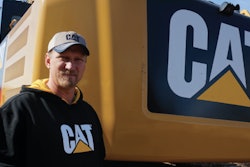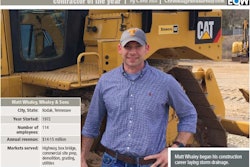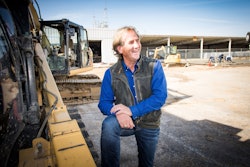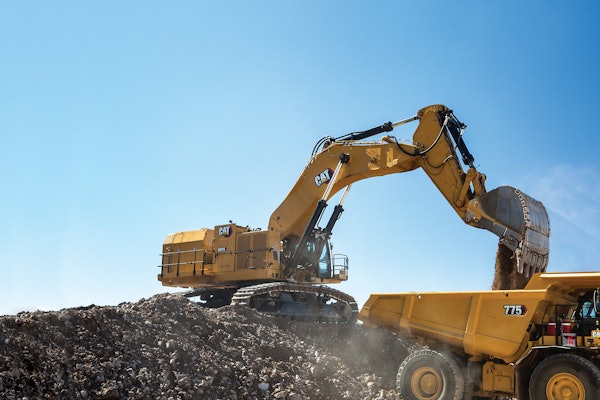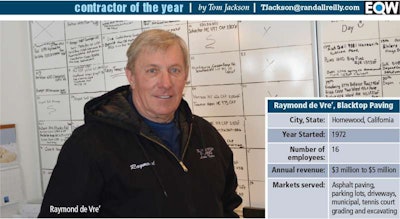
Asphalt paving may be the dirtiest job in construction. Raymond de Vre’s solution – and one of the reasons he’s been so successful in the business of asphalt paving – is that he keeps it clean.
In the Lake Tahoe area, where de Vre’ runs Blacktop Paving, multi-million dollar homes are the norm. De Vre’ keeps these clients happy and reaps referrals from them by keeping his equipment and his jobsites spotless.
Trucks? Blacktop Paving’s signature color is white, the better to show his crews’ attention to detail. “When we roll up to a jobsite, people are impressed at what our company looks like,” says de Vre’. “The guys park in an orderly fashion. They have all their safety gear on. They put out any cones necessary, and then they start downloading equipment. It’s choreographed, like a show.”
That ability to take one of construction’s dirtiest jobs and turn it into a precision performance has enabled de Vre’ to go from a laborer after high school to the owner of a $5 million company.
Pay raise
It was an insultingly small pay raise that first put the idea in de Vre’s head that he should start his own business. Forty-five years ago, he moved from New York to Lake Tahoe, in large part to enjoy the skiing in the California Sierras. He started working for a landscaping contractor and then an excavating contractor, all the while watching, learning and figuring out how to do jobs better and faster.
After six years of this, he decided to go it alone. He didn’t have much money. A friend co-signed his first loan, and a sympathetic equipment dealer gave him a roller, paver and tack pot – all used, on consignment. “He gave me two years to pay it off,” says de Vre’. “I paid it off in seven months.”
As fate would have it, the Tahoe area’s economy slumped just about the time de Vre’ started Blacktop Paving. “I looked at myself and said, ‘I can’t let this fail because I just committed to all this equipment,’” he says.
The solution was a double dose of hustle.
“I went door to door. I would tell people I was doing a job down the street, and if I could do their driveway and the one down the street the same day, I could make them a good deal. It was one of my busiest seasons, and it worked out very well.”
That next season, the house-to-house marketing didn’t stop. “I went out and developed relationships with people in the community, and that just started snowballing,” de Vre’ says. As the economy improved, the contractors, building subdivisions and condominiums noticed his work. “I was doing more advertising by the appearance of my work than I was by the phonebook. People would read my name on the white barricade and call. I still use this same strategy today. Clean equipment, orderly jobsites. All these things are very important to me, because people see that it’s a professional company.”
Positive peer group
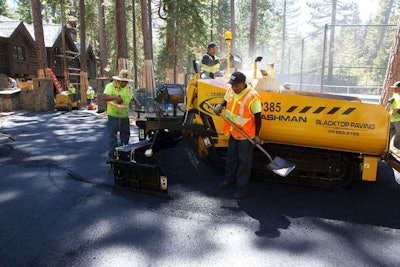
De Vre’ learned by doing, and sometimes by trial and error, but he credits his relationships with mentors and other contractors as a key to his success. Many of those relationships still hold value today.
“This is a very tight community, and I was never afraid to ask other paving contractors with big companies, ‘How do you do this?’ And they would actually guide me along. I have a lot of friends in this business. We call each other; we help each other with problem-solving.”
Some of de Vre’s employees eventually left to form paving companies and compete with Blacktop Paving. But in this small mountain town, community holds sway over competitiveness. “If somebody has a breakdown or needs a piece of equipment, we help each other out,” says de Vre’. “And I’m not afraid to ask.”
Rightsizing
From parking lots and driveways, de Vre’ continued to build the company until the most recent recession hit, and construction in California and elsewhere came to a grinding halt. But like he’d done in the past, de Vre’ turned the downturn into a step up.
As luck would have it, a utility company was digging a trench for a pipeline down the center stripe of several miles of road and needed the cut patched and paved. “We bought a smaller paver for this job and smaller rollers to fit in the ditches,” says de Vre’. “It was a big investment. But the GC saw that we were doing the job the way they wanted, and they gave us more work the following year. All this evolved us to a higher level and pulled us out of the slump.”
The recession also held another silver lining. As paving companies around the state in neighboring Reno, Nevada, began laying off crews, de Vre’ had his pick of talented, experienced craftsmen. “I was able to pick up very good operators, very skilled workers,” he says.
Mix of work
Despite his successes, de Vre’ never tried to grow beyond the business formula that he knew worked and allowed him to achieve the quality he wanted.
“We found our niche was in small commercial, residential and municipal; bike trails and patching; utility line patching; and golf course trails. We work with several excavating contractors and just do the paving for them. They do the base work, and we come in and just lay asphalt,” he says. “Being focused on one thing allows me to be more successful in the bottom line. I know paving. My guys know paving.”
He has branched out into asphalt and concrete recycling. “We pulverize material into the ground and reuse it as a base, and we find it’s a better product,” de Vre’ says. The company will also take out asphalt and concrete and have it recycled into RAP to be used on future projects, a process that’s increasingly popular in environmentally conscious California. The recycling addition to his business mix is no whim. De Vre’ bought a Wirtgen milling machine and a Cat recycler for the work.
Employees
“Our whole business is based on three words: safety, performance and quality,” de Vre’ says. “That goes from the office and office manager to our estimator, out bookkeeper, our whole crew, equipment operators, we all have to work together. It’s a whole team. I believe in teamwork.
“The secret is communicating well with everybody, providing them with the equipment they can work with and standing behind them and recognizing them when they’ve achieved the standard of work you’re trying to do.
“When you have 16 people, you have 16 different personalities, and they don’t all see eye to eye. So, you need to communicate and bring out those concerns so you can work together on them.”
Skiing and paving
In the off-season when not paving, Raymond coached the Squaw Freestyle Team and several Olympic athletes including Johnny Moseley, Shannon Barkey and other U.S. Ski Team members. For 28 years, his strong yet gentle approach delivered the same kind of results and long-lasting relationships on the slopes as those he achieved in the paving world.
His advice for athletes and contractors: “Go after your dreams, and you will achieve them. Work hard, learn all aspects of the business and believe in yourself.”

